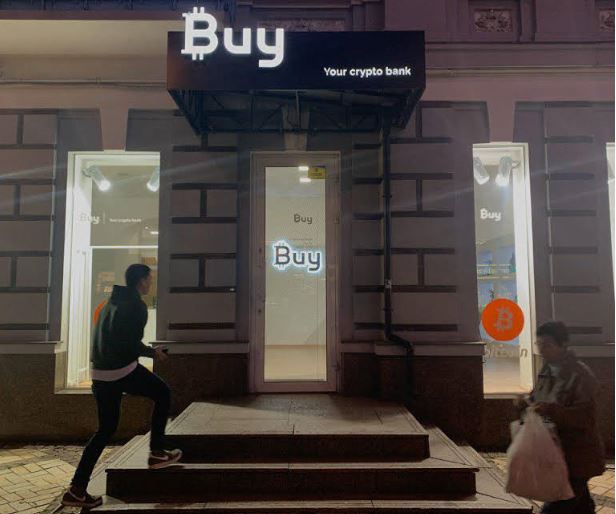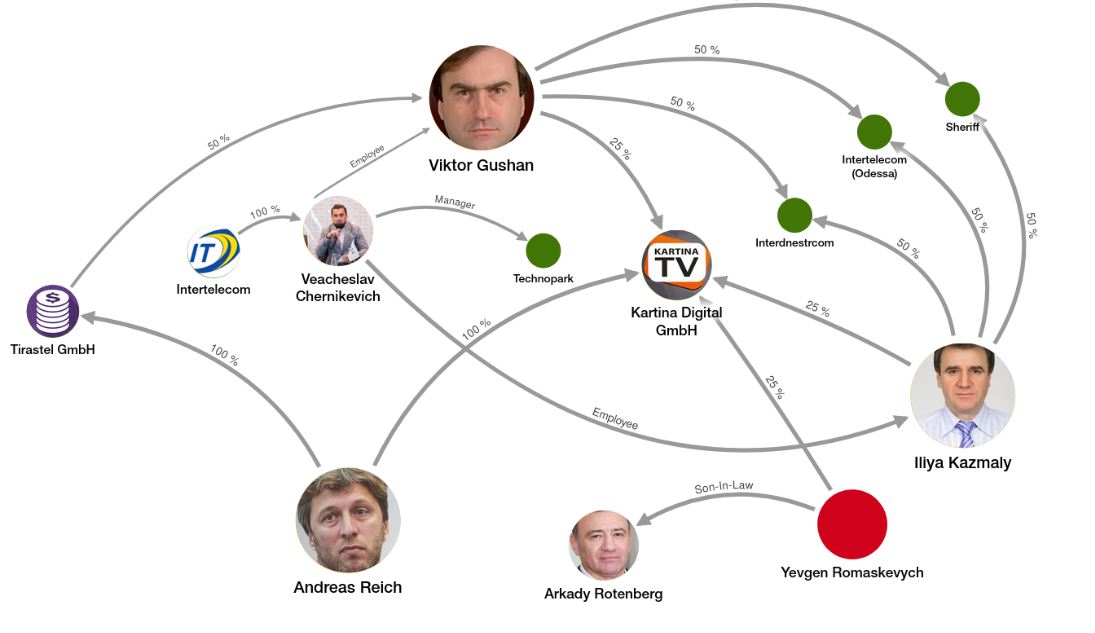How separatists in breakaway regions mine cryptocurrencies for terrorist financing and money laundering
Separatist regimes in Donbas and Transnistria boost economies with Russia’s involvement by mining cryptocurrencies to survive and flourish.
● Characters from the Kremlin's entourage revolve around the cryptocurrency business in the pro-Russian separatist republics of Moldova and Ukraine.
● The mining activity takes place with cheap or free raw material guaranteed by Moscow.
● Legislation in this area is still in a grey zone, and Bitcoin has exceeded the level of 25,000 US dollars per unit.
Andriy, 38, lives in a modest apartment in the eastern Ukrainian region of Donetsk. Unemployed, he decided to make some money by installing a "cryptocurrency farm" in his bedroom. He is already used to the noise of coolers, and the gain is guaranteed.
"For a thousand dollars a month, you have to have 12 Asics [cryptocurrency mining systems]. I had to invest about $ 3,000. I didn't have that money in the beginning. So I decided to buy the Asicsone by one. After paying for electricity and the internet, I now earn about 300 dollars a month. The amount is enough for daily expenses in Donetsk," says Andriy.
The computers in Andriy's bedroom decipher complicated algorithms to obtain virtual currencies that will ensure his financial independence without the need for a job.
About 800 kilometers away, in another separatist region, Transnistria, Moldova, Roman Lutenco, 30, is placing ads on Odnoklassniki and Vkontakte, Russian social networks, to offer rented locations for mining farms in Tiraspol, at "Mining Hotel."
"What I want to know is the value of the investment, whether it's worth starting or not... If a customer with 10,000 dollars calls us, there's no point in starting a business with him," Roman said at the end of the discussion, noting that it's interesting only by "rich investors."
Roman stressed that he offers all the mining conditions: installing the equipment, the connection of electricity to the mining location's security with video cameras, and "guards with dogs." Moreover, he offered to mediate the business with Tehnopark, the company that deals in Transnistria, with all the diligence to open a mining business.
On the Internet forums east of the Dniester, in Lugansk and Donbas, anyone can buy and install mining equipment. Anyone can purchase the parts of the so-called farms, even from electronics stores.
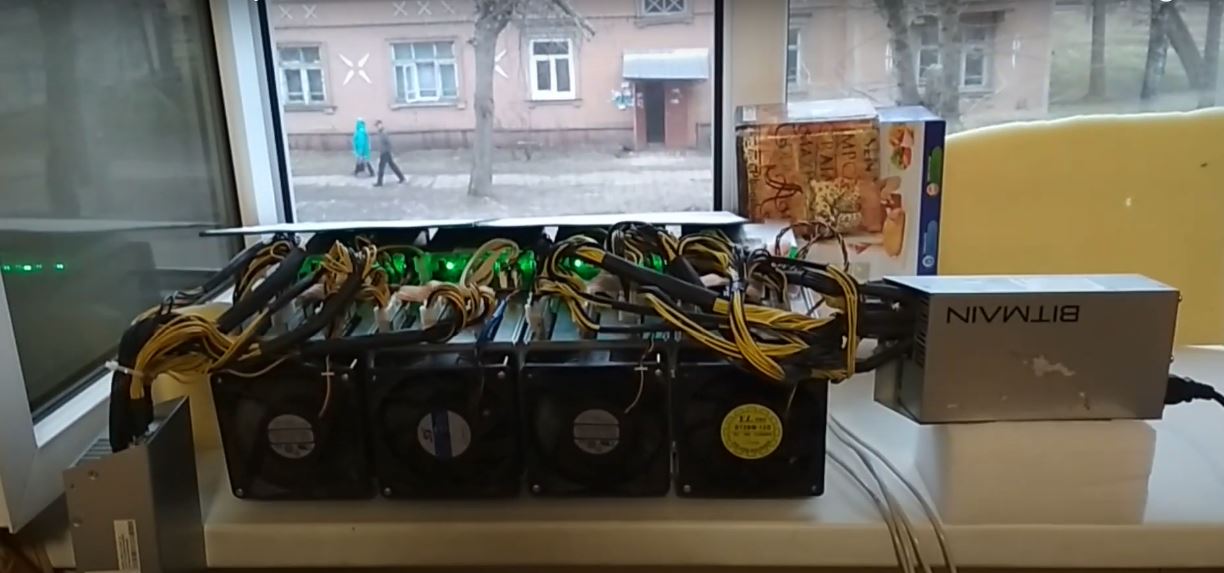
"A mining system is a computer with several integrated video cards. A standard apartment farm includes 4 to 6 video cards per unit. With the help of a particular program, the farm works in the Blockchain system, which creates the cryptocurrency chosen by the user ", explains a salesman from an online store in Donetsk, which we found on Vkontakte.
However, "homemade" mining cryptocurrencies are not so profitable. Experts in this field draw attention that large gains require "serious" investment in high-performance equipment.
Moreover, this must be connected to powerful energy sources in specially designed locations.
"There are dozens of operations that need to be confirmed and signed. If you signed the first one, the process is assured. For that, you are offered a part of the coins as a reward. The stronger the computer, the faster the mathematical problem is solved ", says the Blockchain Moldova Association president, Veaceslav Conev.
The most suitable for developing the mining business on a larger scale, in Transnistria, are the territories of abandoned factories under state management. Here there is an infrastructure for a three-phase current, and it can connect large containers with mining systems.
For example, such a location became the Tirsteklo Glass Factory in Tiraspol. This company has recently reshaped itself, becoming an importer of mining equipment.
In January 2018, Tirsteklo bought from an offshore company in China with Russian management, Goweb International Ltd, mining equipment worth about 8.7 million dollars.
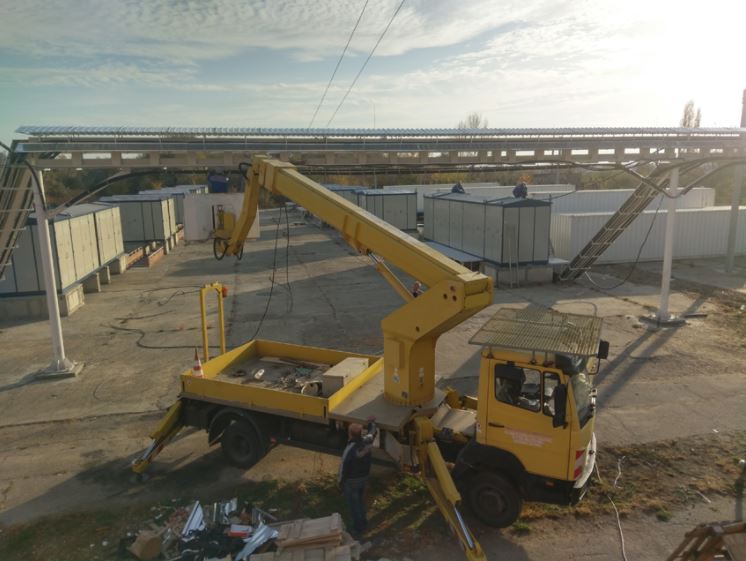
Another suitable area for mining farms in Tiraspol is Energeticeskaia Street, where several abandoned businesses are located. The development of mining farms in Transnistria has become a profitable business, especially for companies specializing in electricity works. In addition to installing computer containers and arranging high-voltage wiring, MegaElektroMontaj began exporting mining equipment outside Moldova.
On November 23, 2020, Moldova's criminal investigation body of the Customs Service started a criminal case on behalf of SRL MegaElektroMontaj to smuggle with a batch of Bitcoin mining systems.
Cold wallets and frozen conflicts
Nowadays, the separatist regimes in Donbas use cryptocurrencies right in the heart of Ukraine, in Kyiv. Ukrainian Secret Services, SBU, sporadically detains miners and cryptocurrency sellers. They are accused of participating in terrorist financing schemes in Donbas.
For example, law enforcement accused the owners of casherbox.com and minertech.org of illegally converting cryptocurrencies in the interest of pro-Russian separatists in the alleged "Donetsk People's Republic". The cases are already in court, but both sites continue to operate normally.
"Ten years ago, cash transfers were made anonymously. And now the cryptocurrency can be stored indefinitely for years on a flash drive," reveals the SBU officer, Andriy A., about the details of the hidden payments.
"These are the so-called "cold wallets ": you put money in, and they stay there. One detail: if the memory flash breaks, the money is lost forever. On such a flash drive, you can store vast amounts of virtual money, and you can carry it unnoticed with you anywhere in the world ", he added.
The cryptocurrency exchange house "Buy" is considered to be the first official exchange service in Ukraine. In reality, the state does not "see" any financial operations behind this exchange office's door.
The sale and exploitation of cryptocurrencies are in a grey zone: they are not forbidden, but they are neither allowed. As there is no law regulating the market for virtual assets, there is also no company registered in Ukraine to handle these operations.
"Individuals and legal entities engaged in the exchange, transfer, storage, and administration of virtual assets are not in the legal field of Ukraine," the Ministry of Digital Transformation of Ukraine told us.
This legal situation seems strange because, in 2020, Ukrainians were the most active users of cryptocurrencies in the world, according to the Chainanalysis report. "State financial monitoring does not inspect legal entities providing services related to the movement of virtual assets," confirmed the first deputy head of the State Financial Monitoring Service of Ukraine, Igor Gaevsky.
"Ukraine ranks first in the global cryptographic community. It is one of the leading countries in the development of the crypto-economy and the implementation of blockchain-based projects ", commented the lawyer Olga Zinchenko about the need to create a legal framework for cryptocurrencies.
Nevertheless, the National Bank of Ukraine compares the cryptocurrency with a monetary surrogate, which has no real value and can not be used in Ukraine as a means of payment.
On the other hand, the National Bank of Moldova, BNM, considers virtual currency a virtual asset and is not issued or guaranteed by a central bank or a public authority.
"The use of virtual currency is limited mainly to speculative purposes and involves many risks generated by anonymity. The risks are related to money laundering, terrorist financing operations, and possible non-compliance with tax obligations," according to BNM.
The same purpose of the cryptocurrency business in Transnistria was revealed by the Association of IT companies' president on the eastern bank of the Dniester, Andrey Babere.
"Bitcoin and other cryptocurrencies can be used to break the banking blockade on Transnistria," Babere said in an interview with local media.
Tiraspol's upset stems from the fact that, since 1999, the National Bank of Moldova has accused Transnistria of terrorist financing and money laundering. As a result of these actions, the banking sector of Transnistria is wholly isolated from the international financial system and closely monitored by Chisinau.
The NBM is the only internationally recognized institution in Moldova to issue licenses to banks operating in Moldova. "The so-called banks in the Transnistrian region have not applied for and do not have the NBM license," a statement from the institution said.
Also, VISA and MasterCards cannot be used in Transnistria. As a result, all money from the region's foreign trade must flow through the NBM.
Simultaneously, in the occupied Donetsk and Luhansk regions, secessionist regimes shifted from theoretical business development to concrete actions.
Mining under Moscow`s touch
In January 2018, Tiraspol legalized cryptocurrency mining after adopting the Law on the development of blockchain technology. The son of the former Prosecutor General of Russia, Igor Chaika, in his quality of the ambassador of the Russian Entrepreneurs Union "Delovaya Rossiya" in Moldova and Transnistria, had an essential contribution to drafting the legislation.
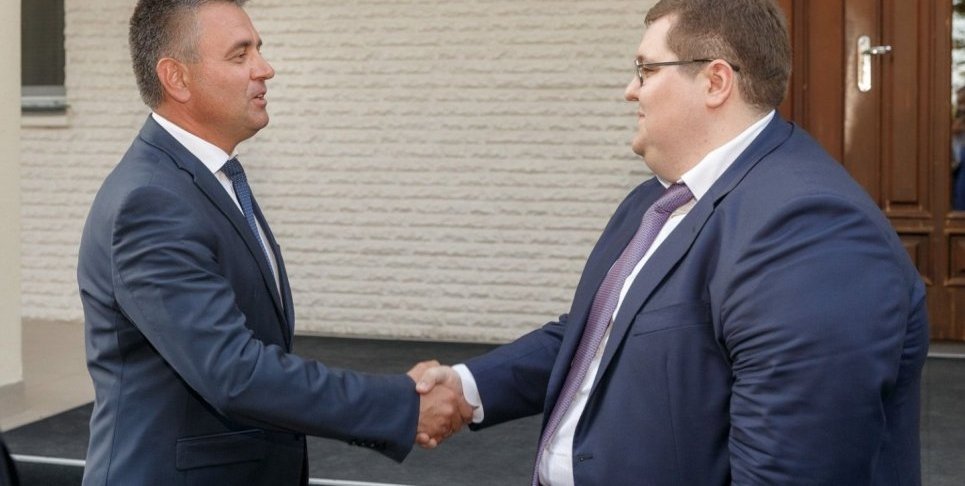
After the adoption of the Law for the Development of Information Technologies in the so-called “Dniester Moldovan Republic,” on January 31, 2018, in an interview for the Russian publication “Kommersant,” Chaika stated that five or six Russian „investors” expressed their interest in this project.
Although the exact value of Chaika's investments in Transnistria is not known, mining has become a kind of branch of the local economy here in recent years, as in eastern Ukraine.
The development of blockchain technology in Ukraine and Moldova's separatist regions involves the following essential conditions: free Russian gas offered by Gazprom in Transnistria and coal from the Donbas mines for eastern Ukraine, lax legislation, and difficult tracking of international cryptocurrency transactions.
The price of electricity in Donbas is 1.7 times cheaper than in the territory controlled by Ukraine. Six thermal power plants produce there a total of 3,000 MW annually. Approximately 800 MW of this volume is used for household consumption. Therefore, 2,200 MW are in surplus and can be used to operate cryptographic farms.
On the other hand, in Transnistria, electricity is four times cheaper than in the rest of Moldova, the equivalent of 0.05 euros per 1 kWh. The electricity sold by Tehnopark to „mining investors” can reach, depending on the volume purchased, 0.03 euros per 1 kWh.
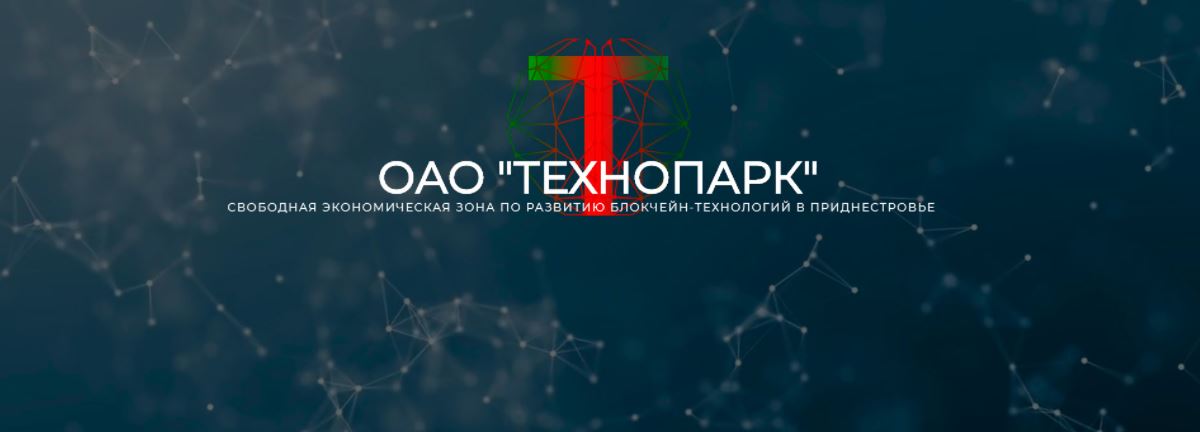
Electricity in Transnistria is produced at the Moldgres Power Plant owned by Russian giant Inter RAO, in southern Transnistria, and at the Tirotex-energo Power Plant, a Sheriff holding property.
"We have a huge reserve of exploited electricity. We can produce up to 700–900 MWh. It is a perspective that we can achieve if there is a demand in this regard," said the head of the Investment Agency from Tiraspol, Andrey Betanov.
According to official Moldgres figures, there is a 20 percent upward trend in Transnistria's domestic consumption in 2018–2020. As in Ukraine, the separatist regime in Tiraspol wants to turn the region into a paradise for cryptocurrency mining.
In addition to the low price of electricity, miners pay no taxes to the Tiraspol regime and, from 2020, are also exempt from customs duties for the import of equipment. Officially, Tiraspol stated that it is satisfied only with the amount of electricity sold to the miners, and it is not interested in cryptocurrency.
In 2019, the alleged prime minister of Tiraspol, Aleksandr Martinov, planned additional revenues to the region's budget of about $15.5 million from mining.
While Kyiv and Chisinau's authorities consider mining a danger to their separatist regions that they do not control, the Russian Federation sees unlimited possibilities in the blockchain. Moscow intends to develop a system of virtual assets in the occupied territories.
According to the Russian president's envoy to Crimea, Georgy Muradov, the region is already developing an investment fund in cryptocurrencies, which will help circumvent European sanctions and solve banking restrictions.
"We are ready to help the Republic of Crimea develop a cryptocurrency economy," Muradov said.
"We have an online platform to attract investors. We can tokenize any sector of the economy. Investors will be able to buy tokens [a kind of shares] of Crimean companies and resell them. It will be very decentralized and will provide anonymity to investors," said Muradov.
The same purpose of the cryptocurrency business in Transnistria was revealed by the Association of IT companies' president on the left bank of the Dniester, Andrei Babere.
In an interview with local media, Barbere said that “Bitcoin and other cryptocurrencies can be used to break the banking blockade on Transnistria.”
The Kremlin's Men
In Ukraine and Moldova, behind the cryptocurrency business are several persons who revolve around the Kremlin on various levels.
More precisely, the mining activity in Transnistria is managed and controlled by the Sheriff holding company, owned by the local oligarchs, Viktor Gushan and Ylia Kazmaly.
The leader of the state company Tehnopark is Veaceslav Chernikevich, a person from Gushan's entourage.
Chernikevich opened his telecommunication company, Intertelecom, in Crimea on May 28, 2014, just a few months, right after the peninsula’s annexation by the Russian Federation.
His company shares the same name - Intertelecom - like one of the largest mobile operators in Ukraine. The Ukrainian counterpart was founded in 1998 by Viktor Gushan and was registered by the Ministry of Justice in Kyiv. Nevertheless, Chernikevich's Intertelecom was registered as a company in Russia. All these companies offer mobile telephony services and high-speed internet providers.
In 2016, the Ukrainian security service SBU investigated Gushan's Intertelecom to intercept mobile phone calls for Russia. Also, the Transnistrian oligarchs Viktor Gushan and Ylia Kazmaly are directly connected to several German companies.
The German connection
In Germany, Bitcoin is not legal tender but is considered a financial instrument. Companies wishing to provide Bitcoin services are advised to consult in advance with the German Financial Supervisory Authority.
Tirastel GmbH is one of the companies that are directly connected to Viktor Gushan and Ylia Kazmaly. The German company was registered in 2004 in the city of Wiesbaden and has sold mining equipment to the Interdnestrcom. Tirastel is managed by the German businessman Andreas and his wife, Irina Reich.
The Moldovan customs service could not tell us the amount of mining equipment imported by Interdnestrcom in 2017–2020.
Simultaneously, the same service informed that the Moldovan legislation does not prohibit importing the parts of such equipment.
Another company connected to the Transnistrian oligarchs is Kartina Digital GmbH, founded in 2008 by the German citizen Andreas Reich 50%, Viktor Gushan 25%, and Ylia Kazmaly 25%.
Kartina TV offers Internet television (IPTV) services in Germany and throughout Europe, including more than 200 Russian television channels, including those that promote anti-EU and NATO propaganda and are editorially subordinated to the Kremlin.
Kartina TV`s owners did not reply to our emails, nor our phone calls to comments.
The company also has a rich archive of movies, series, and TV shows, including political content.
In parallel, Kartina TV is also the business of Evgeni Romaskevich, the son-in-law of Russian oligarch Arkady Rotenberg, one of Russia's closest oligarchs Vladimir Putin's judo partner.
Rotenberg is the co-owner of the Stroygazmontazh group, the largest construction company for gas pipelines and power lines in Russia.
Asked who the foreign mining investors in Transnistria are, the head of the Tiraspol Investment Agency, Andrei Betanov, answered us, after a short telephone conversation with Chernikevich, that "they are from Germany."
Chernikevich, the director of Tehnopark, did not reply to emails for comments.
According to the Economic Adviser of Moldova’s President, former expert of Transparency International Moldova, Veaceslav Negruta, virtual platforms have become new money laundering formulas, using newly emerging technologies, including crypto mining.
He also said that all these facilities are located precisely in regions where no domestic or international law works.
"Transnistria is such a territory, where there is a vacuum of enforced legislation according to international requirements. The same is true for some areas of Ukraine where crypto mining facilities are located ", concludes the expert.
Investigations in the same category:
The stories from www.anticoruptie.md may be used in the limit of up to 1,000 characters. Web pages must indicate the source and link directly to the article. Print media, Radio and TV stations must indicate the source. Publishing full version of stories is allowed based on a prior agreement with the Center for Investigative Journalism. Articles published on www.anticoruptie.md are protected by the Law on copyright and related rights of Republic of Moldova.
Comments

